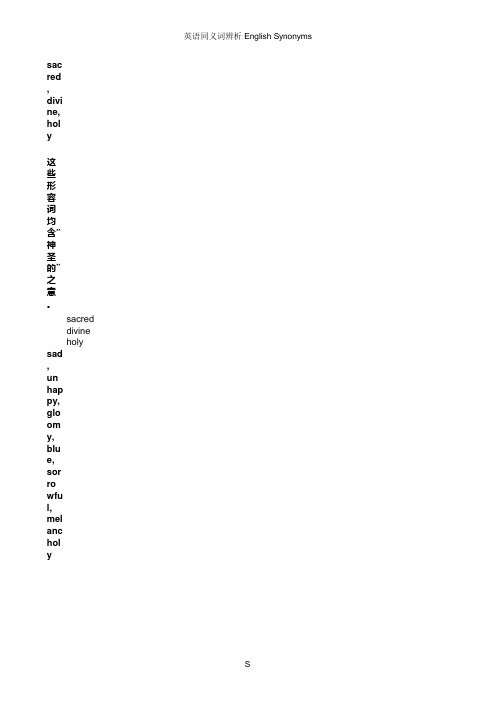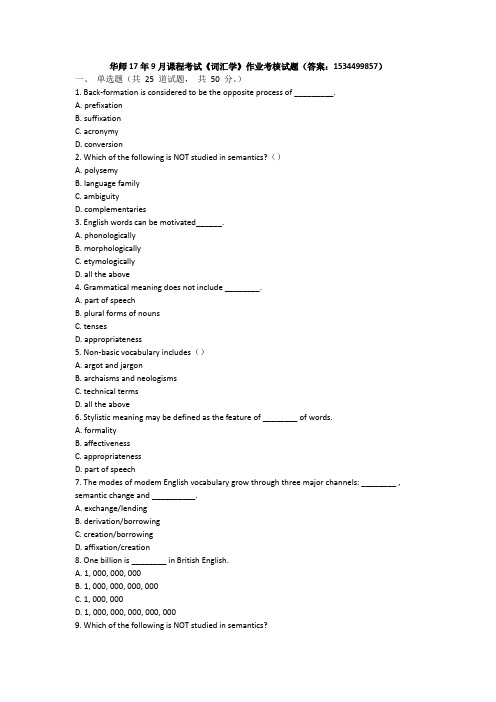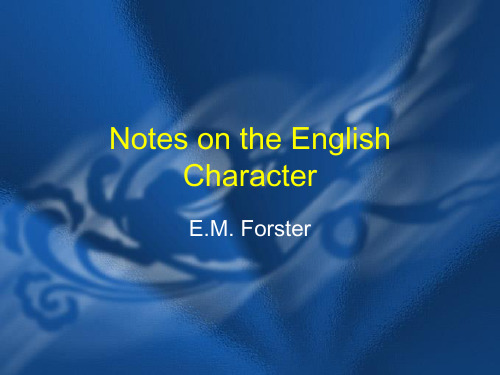English Synonyms T
- 格式:doc
- 大小:29.50 KB
- 文档页数:5

英语常用同义词及其辨析English Synonyms F(三)fat, stout, plump这些形容词都有“肥胖的”之意。
fat : 通俗用词,略含贬义。
指因体内脂肪过多而显肥胖。
stout : 指膀粗腰圆,身体笨重,暗示肥壮。
plump : 指胖得匀称好看,有曲线感。
Father, priest这两个名词均与宗教中的神职人员有关。
Father : 神父,神甫,指对教士的尊称。
priest : 牧师,指天主教及东正教中一个有权执行圣礼的教士。
favourable, fortunate, happy, lucky这些形容词都可表示“有利的,好运的,顺利的”之意favourable : 普通用词,指预示从良好的结果中能得到明显好处,有利于达到目的。
fortunate : 指目前已存在的成功或有利情况,或指因好运或机会带来的成功和喜悦。
happy : 侧重指不是通过某种机会,而是凭借鉴另和选择手段而得到利益与好处。
有时也指偶然得到的好处,但强调的是有利的结果。
lucky : 多指偶然机遇中的有利或幸运情况。
feasible, possible, practicable这些形容词均有“可行的”之意。
feasible : 指完全可行,切实可行,强调成功的较大可能性。
possible : 多用来消除对某事的怀疑,侧重从客观上看有存在或发生的可能。
practicable : 强调经过证明是有效的,合乎实际,行得通的。
feeling, sensation, sense, perception这些名词均含“感觉”之意。
feeling : 最普通用词,既可指身体上的感觉,如冷暖、饥饿、疼痛等,又可指精神上的感觉,如喜、怒、哀、乐、失望等。
sensation系较严密的科学用词,指听觉、味觉、视觉、嗅觉或触觉;还可指引起激动或轰动的事物。
sense : 主要指人或动物身体上的感觉。
复数形式指人的知觉。
perception : 侧重对外界刺激的反应和对产生感觉的物体的辨别。

daily, everyday这两个形容词均有“每天的,日常的”之意。
daily普通用词,特指每天发生一次的,也可指按日计的。
everyday一般日常用词,指日常发生的、无须特别关心的。
danger, risk, hazard, menace, peril, threat这些名词均含有“危险、威胁”之意。
danger含义广,普通用词,指能够造成伤害、损害或不利的任何情况。
risk指有可能发生的危险,尤指主动进行某种活动或去碰运气而冒的危险。
hazard比risk正式,多指偶然发生的或无法控制的危险,常含较严重或有一定风险的意味。
menace所指的危险性最严重,表示使用暴力或造成破坏性的可能。
peril指迫在眉睫很有可能发生的严重危险。
threat普通用词,语气弱于menace,指任何公开侵犯对方的言行,给对方构成危险或威胁。
dark, dim, black, gloomy, obscure, vague, grey这些形容词都含有“完全地或不完全地缺少光亮”之意。
dark最普通用词,指缺乏自然光线或人工照明,使某物漆黑无光或光线十分微弱。
dim指光线不足或视力较差,不能清晰地看见物体。
black侧重颜色是黑色的,有时也指无光的黑暗。
gloomy指光线不足或部分光线受阻而出现的阴暗。
obscure指因光线不充足而使物体灰暗不清,失去光泽或若隐若现。
作借喻时指因复杂、深奥或含糊而难于理解。
vague通常作借喻用,形容抽象事物。
grey与dark意思相近,但侧重阴暗单调的意味。
date, day这两个名词均有“日”之意。
date指具体的年、月、日,或指年代、时代。
day泛指任何一天,或指含有“一昼夜”意义的一天,也可指工作日。
可用复数表时代、时期。
dash, rush这两个动词都有“冲,奔”之意。
dash指以最快的速度向前奔驰。
rush指因急躁或事务紧急而采取快速行动。
dead, dying这两个形容词都有“死”之意。

南京师范大学词汇学考试复习样卷work Information Technology Company.2020YEARI. Each of the statements below is followed by four alternative answers. Choose the one that best completes the statement and put the letter in the bracket.(30%)1.→ boyB.extension, narrowing, specialization and degradationC.extension, elevation, amelioration and degradation4.7. In the idiom 'in good feather', we change 'good' into 'high, full' without changing8. The word "laconic" is ( ).A. onomatopoeically motivatedB. morphologically motivatedC. semantically motivatedD. etymologically motivated9. CCELD is distinctive for its ( ).A. clear grammar codesB. language notesC. usage notesD. extra columns10.Which of the following words is NOT formed through clipping( )A. DormB. motelC. GentD. Zoo11.12.13.Besides French words, English also absorbed as 2,500 words of ( ) in the MiddleA word is a symbol that ( ).A.is used by the same speech community B.represents something else in the worldB.C.is both simple and complex in nature D.shows different ideas in different sounds15. Some words in the basic word stock are said to be stable because they ( ).A. are complex words.B. are technical wordsC. refer to the commonest things in life.D. denote the most important concepts.A.18.It is a general belief that the meaning does not exist in the word itself, but it rather spreads over ( ).A. the reader’s interpretationB. the neighbouring wordsC. the writer's intentionD. the etymology of the word19. Which of the following is a prefix of time and order( )A.extra-B. pro-C. re-D. semi-20. Which of the following dictionaries is not a specialized dictionary( )A. The Oxford Dictionary of English EtymologyB. Chamber’s Encyclopedic English Dictionary.C. Longmont Dictionary of Phrasal Verbs.D. Webster’s New Dictionary of Synonyms.21.Which of the following statements is Not true ( )A.Reference is the relationship between language and the world.B.The relationship between a word and its referent is arbitrary.C.Concept is universal to all men alike.D. Sense denotes the relationships outside the language.22.The words which occur before or after a word and may affect its meaning forms ( ).A.physical contextB. grammatical contextC. lexical contextD. linguistic context23.“Smith is an architect. He designed World Trade Centre.” The clue provided in the context is ( ).A. definitionB. explanationC. exampleD. hyponym24.The term “Vocabulary”is used in different ways because of all the followingC. it can represent all the words used in a certain historical periodD. it can stand for words in a given dialect or field25.A.26.A.28.What causes the ambiguity of the sentence ”I like Mary better than Janet"29. ( )A. VocabularyB. SituationC. StructureD. None of the above29.30.Affixes added to the end of words to indicate grammatical relations are known as ( ).A. bound rootsB. free morphemesC. inflectional morphemesD. derivational affixesII. Complete the following statements with proper words or expressions according to the course book.(10%)31.The form which remains after removing an inflectional affix is called ________ .32.The words which are involved in conversion are nouns, verbs and ________ .33.The stylistic features of words form their ________ meaning.34.________ field refers to a set of words which are semantically related.35.The modes of semantic change in words include extension, narrowing, ________ and semantic transfer.36.________ motivation refers to the words whose meanings are suggested by their morphological structure.37.________ is one of the three kinds of meaning which has nothing to do with language.38.There is no ________ relationship between sound and form as the connection between them is arbitrary and conventional.39.The three main foreign languages that have affected the English vocabulary most are Latin, Greek, and ________ .40.A minimal meaningful unit of a language is ________ .III. Decide whether the statements are true or false and write T (true) or F (false) in the corresponding brackets. (10%)41.Old English refers to the language used between 100 and 450.42.“Radiation” shows that the derived meanings of a polysemant are not directly related to the primary meaning.43.The connection between sound and meaning is conventional and arbitrary.44.A word which has a synonym naturally has an antonym.45.Content words are numerous and more frequently used than functional words on average.46.Extra-linguistic context refers to the physical situation or cultural background.47.During the Middle English period, Celtic, Latin and English existed side by side.48.Inadequate context is often the cause of ambiguity.pounding is the process of creating new words by combining affixes and bases.50.In some pairs of antonyms, one term may cover the meaning of the other word.IV. Match the words or expressions in Column A with those in Column B according to 1) word origin, 2) word formation, and types of synonyms or antonyms. (10%)A B( D ) 51. skill A. back-formation( A ) 52. babysit B. blending( B ) 53. telequiz C. French origin( H ) 54. composition / compounding D. Scandinavian origin( C ) 55. government E.clipping( I ) 56. same / different F. relative synonyms( E ) 57. gent G. Germanic( G ) 58. English H. absolute synonyms( F ) 59. change / alter I. Contradictory terms( J ) 60. big / small J. contrary termsV. Define the following terms (15%)61. notional wordsNotional words are also called content words which denote clear notions.They include nouns, most verbs, adjectives, adverbs and numerals.62. ContextIn a narrow sense, context refers to the words, clauses, sentences, a paragraph, a whole chapter and even the entire book in which a word appears.In a broad sense, it includes the physical situation including the people, time, place and even the whole cultural background.63.Synonyms (P67)Words that are close in meaning are called synonyms, e.g. elevator / lift.64. marked termsMany pairs of antonyms contain specific words and general words. In such a pair, the specific word is included in meaning within the general word. The specific words are called marked terms.65. ambiguityIf there is more than one meaning for a word used in a context, ambiguity occurs.Ambiguity is mainly caused by polysemy and homonymy and sometimes it is caused by structure.VI. Answer the following questions. Your answers should be clear and short. Write your answers in the space given below. (15%)66.How many types of motivations are there in EnglishGive ONE example for each type.(P35)There are four types motivation:1)Onomatapoeic motivation, e.g.cuckoo, squeak, quack, etc.2)Morphological motivation, e.g. airmail, reading-lamp,etc.3)Semantic motivation, e.g. the mouth of the river, the foot of the mountain, etc.4) Etymological motivation, e.g. pen, laconic,etc.67. What are the major sources of English synonyms Illustrate your points.(P47+P62) Key points:borrowing(P62 11); dialects and regional English; figurative and euphemistic use of words; coincidence with idiomatic expressions.68. What are the clues generally provided in verbal context?(P68)Key points:Definition (P68in a broad way, is linguistic context) ; explanation; example; synonymy (P67 8) ; antonymy (P67 9) ; hyponymy (P67 10) ; relevant details and word structure.VII. Writing in about 100 words (10%)69.What have you learned from the course of English lexicology?70.What I have learned from lexicologyDuring our English study, we may ask ourselves such a question: How many words are there in English It is impossible to count the number of words in a language, because it is so hard to decide what counts as a word. Thus, English-lexicological learning is important in some aspects. During the study of lexicology course, I have acquired a lot of useful information which really does help me.Initially, studying lexicology is an effective way to raise the interest level of our English study. Let’s take an example. It is known to us all the meaning of “queue”, but just few people know where it came from because it looks kind of strange and is not like “standard” English words. “Queue” is a French word that old meaning is “tail” and then its meaning is pigtail. If we know this, a picture will come into our minds—there is a long tail out of the box office.Second, studying lexicology well can also contribute to memorizing more words. The English language has increased its resources not only through the adoption of words from other languages, but also through the formation of new words with the material available in the language.Third, English study not only include vocabulary learning but also cultures of English speaking countries, even all western countries. There are many Scandinavian, French, Latin, Greek and other foreign language elements in English. Such as birth、bull、gap、fast、both、till、though and so on. Most of us may feel that these words are so familiar to us. But it is true that they are not native English words.What is written above is what I have learned from lexicology study.。

sacred, divine, holy这些形容词均含“神圣的”之意。
sacreddivineholysad, unhappy, gloom这些形容词均含“忧伤的,悲哀的,伤感的”之意。
sadunhappygloomybluesorrowfulmelancholysafe, secure这两个形容词均可表示“安全的”之意。
safesecuresailor, seaman, mari这些名词均有“水手,船员”之意。
sailorseamanmarinersame, identical, very这些形容词均含“相同的”之意。
sameidenticalveryequalequivalentsatisfy, meet, fulfil这些动词均含“满足”之意。
satisfymeetfulfilsay, speak, state, ta这些动词均有“说、讲”之意。
sayspeakstatetalktellutterscatter, disperse, sp这些动词均含“使分散、使散开”之意。
scatterdispersespreaddiffusescene, view, sight, s这些名词均含“景色、风景”之意。
sceneviewsightscenerylandscapesea, ocean这两个名词均可表示“海、海洋”之意。
seaoceansearch, seek, comb这些动词均含有“寻找”之意。
searchseekcombseatsitsend, deliver, dispat这些动词均含“送出,发送,传送”之意。
senddeliverdispatchforwardshiptransmitsentence, condemn,这些动词均含有“判决、宣判”之意。
sentencecondemnjudgeconvictdoomsequence, progress这些名词均含“连续,顺序”之意。
sequenceprogressionseriessuccessionservant, waiter, atten这些名词均含“服务员”之意。

华师17年9月课程考试《词汇学》作业考核试题(答案:1534499857)一、单选题(共25 道试题,共50 分。
)1. Back-formation is considered to be the opposite process of _________.A. prefixationB. suffixationC. acronymyD. conversion2. Which of the following is NOT studied in semantics?()A. polysemyB. language familyC. ambiguityD. complementaries3. English words can be motivated______.A. phonologicallyB. morphologicallyC. etymologicallyD. all the above4. Grammatical meaning does not include ________.A. part of speechB. plural forms of nounsC. tensesD. appropriateness5. Non-basic vocabulary includes()A. argot and jargonB. archaisms and neologismsC. technical termsD. all the above6. Stylistic meaning may be defined as the feature of ________ of words.A. formalityB. affectivenessC. appropriatenessD. part of speech7. The modes of modem English vocabulary grow through three major channels: ________ , semantic change and __________.A. exchange/lendingB. derivation/borrowingC. creation/borrowingD. affixation/creation8. One billion is ________ in British English.A. 1, 000, 000, 000B. 1, 000, 000, 000, 000C. 1, 000, 000D. 1, 000, 000, 000, 000, 0009. Which of the following is NOT studied in semantics?B. language familyC. ambiguityD. complementaries10. “child—parent”are ()antonyms.A. rootB. derivativeC. relativeD. complementary11. “sow”(to plant seeds on the ground) and “sow”(fully grown female pig ) are called()A. HomophonesB. homographsC. perfect homonymsD. acronyms12. ()is not a characteristic of basic word stockA. ColloquialismB. All national characterC. StabilityD. Polysemy13. “sow”(to plant seeds on the ground) and “sow”(fully grown female pig ) arecalled ________.A. HomophonesB. homographsC. perfect homonymsD. acronyms14. “child—parent”are _______ antonyms.A. rootB. derivativeC. relativeD. complementary15. The word “water”is _________ motivated.A. phoneticallyB. semanticallyC. morphologicallyD. non-16. Conversion is a method of __________.A. turning words of one part of speech into those of a different part of speechB. converting words of one meaning into those of a different meaningC. deriving words by grammatical meansD. changing words in morphological structure17. According to the idiomaticity of idioms, idioms include ________.A. true idiomsB. semi-idiomsC. regular combinations18. Non-basic vocabulary includes __________.A. argot and jargonB. archaisms and neologismsC. echnical termsD. all the above19. Narrowing excludes ________.A. change from material nouns to common nounsB. change from common nouns to proper nounsC. words shortened from phrases to retain the meaning of the whole for economyD. change from specific meanings to general meanings20. “The birds sing to welcome the smiling year. ”Is an example of()A. euphemismB. synecdocheC. metonymyD. metaphor21. The hyponyms of ‘vegetable’are()A. banana, pear, jamB. pear, apple, bananaC. cucumber, celery, peasD. tree, pine, elm22. Functional words are ________________.A. adverbs, prepositions, conjunctionsB. adjectives, nouns, articlesC. articles, prepositions, conjunctionsD. verbs, pronouns, prepositions23. Stylistic meaning may be defined as the feature of ()of words.A. formalityB. affectivenessC. appropriatenessD. part of speech24. _________ is a word-formation process by which a word is changed from one word-class into another without the change of form.A. BlendingB. AffixationC. Back-formationD. Conversion25. Motel is a/an is ________.A. blendB. clipped wordC. initialismD. acronym二、判断题(共25 道试题,共50 分。

english synonymstalk听力原文答案Text 1M:Are you making cups today?W:No,we’re going to make a large vase for some flowers.I like going to class and learning new things.It makes me feel good.Text 2M:Do you want the same cut as last time?W:The same on top,but I’d like it a little longer over the ears and in the back.Text 3W:I wonder what’s happened to Jerry.He hasn’t been around for at least 2 weeks.M:He took leave to see his mother in Europe.Text 4W:Hello!I am interested in purchasing that clock.I have been late to work almost every day this week.M:Well,luckily,this one has an alarm clock.I use the same one every day myself,and it is very helpful.Text 5W:Lewis,Don told me that he could get you that Lady Gaga signature through a friend at work if you’re still interestedin getting it.M:Still interested in getting it?Um,I have every single Lady Gaga CD,and my wall is covered in her pictures!If I ever get a pet dog,I’ll probably name her Gaga,that’s how into her I am,so…Text 6W:Look at those pictures!They’re fantastic!You’re so talented,James.And wow,what a cool camera!M:It’s a Nikon D200,and it’s really easy to use.But now,I’m planning to save up for a new Olympus E1.It will definitely cost me an arm and a leg.W:Sounds quite professional.Anyway,would you please bring your camera with you next Sunday and take some pictures of us while we’re playing tennis?M:Sure,you got it.Text 7M:There is just one problem,madam.Your driver’s license is no longer valid.W:What?M:Yes.Today is the 19th,and your driver’s license was valid through the 17th.I’m afraid we can’t accept it.Do you have another form of ID?W:Not with me.My passport is at home,but that’s 30 minutes away.M:I do apologize,but this is our policy.If you want to continue with your deposit,you might have to go home and get it.W:That’s OK.I’ll just come back tomorrow with my passport.I need to try to get a new license now.Otherwise,I won’t be able to drive home!Text 8W:Can I help you?M:Oh,I’m just looking,thanks.Well,actually,I’m looking for something for my sister.W:And what exactly are you looking for?M:I don’t really know.A dress?W:Right.Well,what color does your sister usually wear?M:Oh,dear…W:Okay,what color are her eyes?M:Green.W:OK,purple usually suits people with green eyes.M:Oh,great,purple’s fine.W:Now,what size is she?M:Um,well…she isn’t very big,but she’s not particularlythin,either.W:That’ll be a medium,then.Well,we have this rather nice silk evening dress here…M:Good,I’ll take it.How much is it?W:$70,sir.How would you like to pay?M:Seventy?!Uh,by credit card,please.W:Fine.If you could just sign…M:Here you are.Goodbye.W:Just a minute,sir.Here’s your receipt.M:Oh yes,uh…can she exchange it if it doesn’t fit her?W:Yes,but she needs to bring the receipt.Text 9W:Young man,I couldn’t help but overhear your conversation with the gentleman who just gave you directions.M:Uh-huh…W:I think he must be confused.The directions he gave you are all wrong.If you follow them,you’ll have a lovely ride,but you’ll end up at the zoo.M:What should I do,then?W:Come with me.I’m heading in the direction where you can catch the bus you want.We’ll just continue down Gold Road here for a few minutes.M:OK,great.Thank you.…W:Here we are.This is the corner of Wall Street and Gold Road,and here’s your bus stop.Take the F-1 down to the river,and get off at Riverside Road.M:And that’s where the church is?W:No,transfer there to the L-5 going north.The end of the line for L-5 is just across the street from Riverside Church.The whole ride shouldn’t take you more than 30 minutes.M:Thanks.I’m glad you set me straight.Is that my bus coming down the street now?W:Yes,it is.I hope you have exact change.The driver doesn’t give change to passengers.M:I have quite a few quarters with me.Thanks again!Goodbye.Text 10M:Many young girls dream of being models.Now,my first question:How were you able to make your dream a reality?W:I actually spent my childhood being a model.My mother put me in TV commercials and other advertisements when I was just a small baby.M:Do you think that modeling has influenced your life at all?W:It’s difficult to say.Sometimes I feel like it’s hard to make friends when you are a model.It seems like all they care about is my looks.I travel a lot,and that also puts a lot of stress on any relationships that I have.M:What is your favorite part of being a model?W:I really like all of the traveling that I get to do.I have been able to go to Europe and Latin America and a lot of other beautiful locations around the world.I think the best thing,though,is having people look at me and think that I’m beautiful.I love the attention.M:Now,finally,do you have any advice for young girls that want to be models?W:Sure!I just want to tell you guys never to give up,and don’t let anyone ever tell you that you are not beautiful…because everyone is beautiful in their own way!。
abandon, desert, for这些动词或词组均含“抛弃、放弃”之意abandondesertforsakeleavegive upability, capacity, cap这些名词均可表示人的“能力,才能”之意。
abilitycapacitycapabilitygeniustalentcompetencefacultygiftaptitudeable, capable, comp这些形容词均含有“有能力的,能干的”之意ablecapablecompetentabolish, cancel, repe这些动词均含“取消、废除”之意abolishcancelrepealabout, around, roun这些词均有“在周围、在附近”之意。
aboutaroundroundabove, on, over这些前置词均含“在……上”之意。
aboveonoverabsorb, suck, diges这些动词均有“吸收”之意。
absorbsuckdigestincorporateabsurd, ridiclous这两个形容词均含有“荒谬的”之意absurdridiclousabundant, plentiful,这些形容词均有“充分的、丰富的”之意。
abundantplentifulampleaccept, receive, adm这些动词均有“接受、接纳”之意。
acceptreceiveadmittakeaccident, incident, e这些名词均有“事故、事件”之意。
accidentincidenteventoccurrencehappeningaccompany, conduc这些动词均有“陪同,伴随”之意accompanyconductattendescortaccordingly, conseq这些连接副词均有“因此,所以”之意。
accordinglyconsequentlyhencesothereforethusaccount, report这两个名词的有“报道,叙述”之意。
试题一第一部分选择题I. Each of the statements below is followed by four alternative answers. Choose the one that would best complete the statement and put the letter in the bracket。
(30%)1。
In Old English there was _______ agreement between sound form.A。
moreB. littleC。
lessD。
gradual2.Both LDCE and CCELD are _______。
A。
general dictionariesB. monolingual dictionariesC. both A and BD。
neither A and B3。
The word ”MINISKIRT" is _______。
A。
morphologically motivatedB. etymologically motivatedC. semantically motivatedD. none of the above4。
The most important way of vocabulary development in present—day English is _______。
A。
borrowingB。
semantic changeC。
creation of new wordsD. all the above5。
Generalization is a process by which a word that originally had a specialized meaning has now become ________.A。
generalizedB。
expandedC. elevatedD。
tactic(s), strategy这两个名词均有“策略,战术”之意。
tactic(s) : 在军事上指在战场或军事行动中如何用兵的具体战术,多暗示指挥员在场具体指挥;也指为完成某计划而采取的策略或手段。
strategy : 指全局性的前线战略部署,也可指为达到某种目的而采取的策略。
take, grasp, grab, grip, clasp, clutch, snatch, seize这些动词均有“抓住,握紧”之意。
take : 最普通用词,不带感情色彩。
指用手抓、取某东西或控制某物。
grasp : 指紧紧抓住、抓牢。
grab : 指粗暴而急迫的抓住。
grip语气比grasp强,指用手的最大力量紧紧抓住。
clasp : 指用手紧握或用臂紧抱。
clutch : 强调匆忙、紧急地抓、抓紧。
snatch : 指突然抢走,侧重动作更快或更具暴力性质。
seize : 指突然抓住某物,强调突然的猛烈动作。
tax, impose, assess这些动词均有“征税”之意。
tax : 普通用词,指用各种不同方法向个人或单位征收所得税、房地产税等各种税款。
侧重实际征收金钱。
impose : 指在决定个别案件中的处罚或罚款,尤指政府征收某种税收的决定。
assess : 指一般情况下,征收房地产税、罚款或其它费用。
teach, instruct, educate, coach, train, tutor这些动词均含“教,教育,培养”之意。
teach : 最普通用词,含义广泛。
指直接教某人知识或技能等,侧重传播知识和帮助应用知识。
instruct与teach含义很接近,但语体较正式。
指系统、详细、精心地传播知识,侧重教授与指示。
educate : 较正式用词,指教育,内容比teach广泛,侧重动机或结果,或对潜在能力的开发。
coach : 指对个人或小组等进行辅导、训练或补课。
train : 指训练与培养。
tutor : 指进行个别教学或课外辅导。
tear, rip, split这些动词均有“撕裂、扯破”之意。
tear : 最普通用词,指有意或无意地把布或纸等没接缝的材料撕开。
可作引申用。
rip : 侧重指用力把布料等物撕开,也可指用粗暴手段把某物撕裂。
split : 非正式用词,指有力的切断、劈开或撕裂的动作。
technique, technology这两个名词均有“技术”之意。
technique : 多指具体的某种技术和技巧。
technology含义比technique广泛,泛指生产工艺、科学技术。
temper, character, nature, personality, disposition, complexion这些名词均有“性格、气质、性情、习性”之意。
temper : 指从感情方面体现出来,决定处理问题或应付形势的方式的性格或性情,这种性情可以是暂时的也可以长久的。
character : 指对个性或人格所作出的客观评价,常常与道德有关。
nature : 指天生的、不可改变性格。
personality : 主要指一个人稳定的心理特征。
disposition : 书面用词,指人的主要爱好或思想、精神方面的重要习性、气质。
也可指短暂的情绪。
complexion : 指由思维方式、态度和情绪所决定的本质特征。
temporary, momentary, transient这些形容词均含“短暂的,瞬息的”之意。
temporary : 普通用词,其反义是permanent。
指持续有限的可计时间,着重暂时的存在、应用或效应。
momentary : 指瞬时即逝的,也表明间很短的。
transient : 指停留或延续的时间很短。
term, semester这两个名词均有“学期”之意。
term和semester作“学期”解时,其主要差别在于使用地区的不同。
term多用于英国,semester主要在美国、德国使用。
think, conceive, imagine, fancy, realize这些动词均可表示“在思想中形成一个看法或观念”之意。
think : 最普通用词,指想或思索,也指由反复思考而作出判断或得出结论等。
conceive : 指在头脑中组织好自己的思想,在心中形成一个系统的思想或一个见解。
imagine比conceive更强调形象思维,指在头脑中形成一个清晰明确的意象。
fancy与imagine略不同,往往指的是不切实际的,属于梦幻般的想象。
realize : 指领悟,通过生动的构思或想象从而抓住事物的本质。
think, deliberate, meditate, muse, reason, reflect, speculate这些动词均有“思考、判断、思索”之意。
think : 一般用词,指开动脑筋形成看法或得出结论的脑力活动。
不着重结论是否正确,见解是否有用。
deliberate : 指缓慢、按部就班地作仔细而认真的思考或判断。
meditate : 语气较强,指认真地长时间集中精力进行思考。
muse : 通常指漫无目的地猜想。
reason : 指根据资料、证据或事实进行推断,作出结论或判断的逻辑思维活动。
reflect : 指回想或回顾,侧重认真而冷静地反复地思考某个问题,尤指对已发生事情的思索。
speculate : 指推论过程,隐含在证据不足的基础上作出推测或设想。
threaten, menace这两个动词均有“威胁、恐吓”之意。
threaten : 侧重扬言要对不服从者给予惩罚,有时指某种情况所预示的恶兆。
menace : 系正式用词,着重以脸色或某种意志给以威胁,而不用语言明白表示出来。
though, although, as这些连词均可表示“虽然,尽管”之意。
though和although在意义上几乎毫无区别,但文体上后者是较正式用词,语气比though 强。
此外,在习惯用法上这两个词仍有以下一些差异:1.though可引出倒装语序的让步状语从句,although 则不能。
2.though可与even连用,although则不能;在as though结构中,只用though,不能用although。
3.though可以置于从句末,而although则不能。
4.引出省略句时,通常用though。
as : 引出让步状语从句只用于倒装语序结构中,语气强于上述两个连词。
throw, cast, fling, heave, hurl, pitch, toss这些动词均有“抛、投、掷”之意。
throw : 普通用词,使用广泛,仅指用力抛掷,不涉及动作方式或感情色彩。
cast常可与throw互换,指迅速扔出一个重量较轻的物体。
fling : 指用力投掷,或因感情激动而粗暴地或漫无目的地扔东西。
heave : 指把重物举起后扔出。
hurl : 通常指用力投掷,动作迅猛,所投掷的距离也较远。
pitch : 指随意地、轻轻地掷或扔,侧重方向性和有明确的目标。
toss : 指无什么目的地、轻轻地、随意地掷或扔,所扔掷的东西一般都比较轻。
tip, slope, tilt这些动词均含“倾斜”之意。
tip : 指向一边倾斜或向上翻转、失去平衡或完全翻转过来。
slope : 指向上或向下渐渐倾斜的表面,多用于山、屋顶等缓缓倾斜。
tilt : 指有意识地或长时间地使物体处于倾斜状态。
title, name这两个名词均有“名称”之意。
title : 指书名、剧目或其他文艺创作作品名称,也指附在姓名前的职称或头衔。
name : 最普通用词,指人、动物或事物的姓名、名称或名字,也指在特定情况下给予人或事物的特殊名称以体现其内在特点。
tolerantj, merciful这两个形容词均含“宽容的”之意。
tolerantj : 指不固执己见,能够宽容或谅解他人的开明态度。
merciful : 指同情或怜悯。
too, very这两个副词均可表示“大,很”之意。
too : 指超过了承受能力或程度,即程度加到了不适当的地步。
very : 用于加强程度,可修饰褒义词和贬义词。
total, sum, whole这些名词均有“总数、全体”之意。
total : 指总量之大,强调每一构成部分或成分均被计算在内。
sum : 指两个或更多的数目相加的总和。
whole : 着重其中没有部分或成分被忽略不计。
touch, inspire, move这些动词均有“感动,打动”之意。
touch : 主要用于表示怜悯或同情等场合,侧重感动。
inspire : 指激起勇气和信心,侧重鼓励,有时含“启发灵感”之意。
move与touch可换用,但语气强一些,运用范围广些。
translation, version, paraphrase这些名词均含“翻译,译文”之意。
translation : 普通用词,指从一种语言到另一种语言的翻译。
version可与translation换用,尤指不拘泥于文字的意译,更常指某种作品的一种译文。
paraphrase : 可指非常自由的解释,不拘泥遣词造句,重在传意。
通常指用同样语言深入浅出地解释艰深的句子或段落。
transparent, clear这两个形容词均可表示“透明的”之意。
transparent : 指某物完全透明状态,通过它能清楚看到其它东西。
clear : 指视力不受阻碍,强调清晰透澈。
trial, experiment, test, try这些名词均有“试验”之意。
trial : 指为观察、研究某事物以区别其真伪、优劣或效果等而进行较长时间的试验或试用过程。
experiment : 多指用科学方法在实验室内进行较系统的操作实验以验证、解释或说明某一理论、定理或某一观点等。
test : 普通用词,含义广,指用科学方法对某物质进行测试以估价其性质或效能等。
try : 普通用词,多用于口语或非正式场合,指试一试。
trend, tendency, current这些名词均含“趋势,倾向”之意。
trend : 指事物发展总的方向、倾向或趋势。
tendency : 指固有或习得的倾向性,强调没有外来的影响或干扰。
current : 指向某一方面发展或在确趋向中行动。
trumpet, bugle这两个名词均有“喇叭,小号”之意。
trumpet : 泛指一般由黄铜做的喇叭,不拘大小而言。
bugle : 一般指军队中吹信号用的小喇叭。
turbulent, stormy, violent, wild, fierce这些形容词均含“剧烈的,凶猛的,狂暴的”之意。
turbulent : 正式用词,多用描写风和水,也可指心神不定或控制不住的感情波动。
stormy : 指风雨大作,也指人很激动的感情。